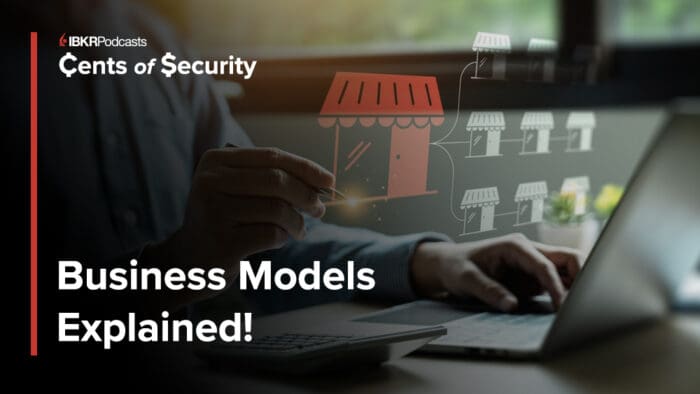Getting started in real estate investment can be a lot more complex than it seems. What type of property are you looking for? How much money do you want to invest? Who will manage the property? Riley Adams, Founder and CEO of WealthUp joins Cassidy Clement, IBKR’s Senior Manager of SEO and Content to discuss.
Summary – Cents of Security Podcasts Ep. 42
The following is a summary of a live audio recording and may contain errors in spelling or grammar. Although IBKR has edited for clarity no material changes have been made.
Cassidy Clement
Welcome back to the Cents of Security podcast. I’m Cassidy Clement, Senior Manager of SEO and Content at Interactive Brokers. Today, I’m your host for our podcast. Our guest is Riley Adams, Founder and CEO of WealthUp.com.
WealthUp is a place for people of all ages to learn about money to discover their financial selves and develop the skills they need to grow their nest egg.
When getting started in real estate, the investment can be a lot more complex than it seems. What type of property are you looking for? How much money do you want to invest and who will manage the property? Today we will explore all those questions and more. Welcome to the program, Riley.
Riley Adams
Hello, Cassidy. Thank you so much for having me on. It’s an honor to be here.
Cassidy Clement
Thank you so much.
Because this is your first time on the podcast, why don’t you tell the listeners a little bit about yourself and your background in the industry?
Riley Adams
I am the Founder and CEO of WealthUp.com. Before that, I was a Googler. I worked in their Finance Department and I managed several very large advertising incentive programs, and prior to that I worked as a financial analyst at a power company based in New Orleans.
As far as my experience in real estate, I finished up graduate school. I moved home and I’d saved up enough money from investing through my Interactive Brokers account that I took that money and I actually put it as a down payment on a condo in downtown New Orleans.
And I knew long term it was not going to be where I was going to live once I got married and had a family. But I knew that it was on the edge of downtown, so it was always going to be something that was attractive that people wanted to rent.
So I lived there for I think about two or three years before my now wife and I decided to move in. And we, with the help of my parents, bought a multi-unit property also in New Orleans, but a little bit farther away from downtown. More space.
And it was a three-unit property where we lived in one of the units, rented out one of the other units to long-term tenants who were students at the nearby Tulane University, and then the other unit we maintained as a short-term rental on Airbnb.
So all told, if you don’t count the experience of my family managing their rental in Shreveport, I would say I was a rental property owner for seven or eight years.
Cassidy Clement
Well, all of that is exactly part of the residential real estate investment and bleeds into some of the other items that we’ll talk about today.
So usually listeners will probably be like I know what a real estate investment is. It might be something commercial like I’m going to buy a strip mall or a retail store and then rent it out. Or maybe, like you said, a multi-unit home or town home, condo. Something like that. And then rent it out or the other example you gave is perfect.
A lot of people say, hey, I might be only moving temporarily so let me keep this and use it as a rental property. But more of a traditional sense of the word or the question, what constitutes a real estate investment when it comes to more of a financial terminolog style answer?
Riley Adams
Sure, sure. So I can only speak to the residential side of that. There is definitely an active market for the commercial real estate sector. I can’t give you any sort of rules of thumb for that. So I won’t try to make those things up. So when I speak about what constitutes a good real estate investment, I’m speaking strictly on the residential side of things.
And I suppose one element of that is very similar on the commercial side, it’s just the rentability of the property you’re looking to buy. Are you consistently able to get quality renters in this location, residential or commercial? Are you able to be in a desirable area?And that could mean really one of three things here.
One, it could be you’re buying in an area that is perhaps not overly nice yet, but you see green shoots sprouting up where it looks like this is becoming a nicer area. So perhaps buying something now at a low-cost entry point and holding it for the long- term could be a good decision because you might have the ability to increase the rent. And then down the road, presumably if it is an up-and-coming area, you would have appreciation on the property as it grows in value.
And the other two scenarios are it’s just a flat, it’s not getting worse, it’s not getting better, it just kind of is what it is. But you still have the ability to get quality tenants. Those are things that are certainly still attractive to have because some markets aren’t going up or down, they are just kind of flat and moving sideways. But that still doesn’t mean you couldn’t get a good rental property where the rent keeps pace with inflation.
Overtime that’s still a good investment assuming you get a mortgage, a fixed rate mortgage that stays the same. If you are counting on inflation to increase your rent, that is built-in upside over time. So that’s certainly something worth considering.
And the last one that you probably would like to avoid is you’re looking for property and the market you’re looking at is just declining overall. That’s never really a great situation to find yourself in. That means you’re buying at the top, you probably can’t find quality tenants overtime and your property value could decline or stay the same. And if it doesn’t move and inflation goes up, essentially you’re actually losing value on the property, even if it doesn’t go down directly.
But what you should look for on the residential side past those elements.. one rule of thumb that I always aim to achieve is called the 1% rule. That’s typically the gold standard. And the way that works is with the monthly rent that you can expect to get from your tenants, you’re looking to get at least one 1% of your all-in cost.
Which means if you buy a house for $100,000, you have closing costs of $2000, repairs that are maybe $3000. You’re looking at about $105,000. That means to get 1%, if I can do math here, you’re wanting to get at least $1050 of rent per month.
If you can get that mark, you’re achieving the 1% rule. And if you’re in an area, like I said, that’s coming up or it’s flat and you can expect rent to go up overtime, that 1% rule you’ll see, it will take a little bit of time, but you can see that it’ll go above that 1% mark.
And that in my mind has always been what I’ve tried to achieve with my rental properties. And what I’ve always tried to write about on the website if you’re looking to get into real estate investing on the residential side, this is a great thing to just kind of measure like is the opportunity worth pursuing.
Cassidy Clement
You brought up like a really good point. I mean, obviously nobody goes into real estate investment looking for something they want to have a headache over if they pursue it. You have to do your homework. And what really makes the real estate investment is of course you’re trying to find some type of gain out of it, whether it’s another revenue stream or diversifying your portfolio, if it’s more along the REIT side.
And then there’s different levels for the type of investment that you’re going for. Usually people will say, OK, great, I totally have seen the for-sale signs as I drive around, I have totally seen the rental listings online. But how does somebody actually invest in real estate? Because that’s such a broad question. If you were to answer it from all of your experience.
Riley Adams
You have got really a number of different avenues you can pursue if you’re wanting to invest in real estate. The one that I’ve personally done as we’re talking about here in the call, is the direct ownership model where you are the person who is acquiring the property entirely by yourself. You’re not going in with other investors. It is just you buying a property and maintaining it, managing it yourself.
And there are lots of different flavors within how you do that. In one case, one property we did co-own it with my parents, but they were definitely silent partners. They were not really interested. They were just trying to invest some money that they had gotten from an inheritance. My mom had gotten from her mother. And we were the people who did all of the renovations. We’re the ones who did all the tenant screening. We did all of the leg work essentially to get this thing from where it was when we bought it to being something we could rent on the market.
And there are lots of different things. You could do single family homes where there’s only one tenant you presumably have. You could also do, like how we had, a multi-family unit. You could do commercial properties. All kinds of different flavors there that you can do with the direct ownership model. The other two ways that I have a little bit of experience with. One is a REIT, which is a real estate investment trust. And that’s where you’re hiring companies to go out and buy properties that they think are advantageous to own long term and then they have either management on staff or they get a third party to manage these different properties.
So effectively you’re giving the capital to invest in these properties. And in return you are expecting to receive usually 2 components. The income that would be expected from rents and then the long-term capital appreciation of these properties. Because there might be a day where the mandate from these funds is to buy a property, invest heavily in it, rent it out for 5-10 years call it, and then as it appreciates and it hits some target sales price, they then flip it.
That would be money that would be coming back to you. So that’s the real estate investment trust model and there is one tax benefit. To get the favorable REIT tax structure, at least 90% of the rental income generated by properties owned by the REIT needs to be distributed to investors in the form of dividends to avoid any sort of tax hit that comes on that to the REIT. It is only then paid by the investors, assuming they meet all those qualifications on the tax run. But the last one, it’s more of a new age type thing. I want to say it was sometime in the second term of Obama’s presidency. I believe it was the JOBS Act. I don’t recall exactly the name of it, but it’s the one that essentially opened up the opportunity to do crowdfunding. Which is instead of having one person buy a property, you can go out and collectively get thousands of investors to put in $10, $100, $10,000, whatever amount they want to invest into various different properties. And they can then be operated by the crowdfund platform. Or they can use a third party to manage and operate the property.
And that’s more one that’s come in vogue recently, especially in the accredited investor space. Which means you have to meet the requirements set forth by the Securities and Exchange Commission in order to market these investments to certain types of investors.
And that’s a big play for the commercial real estate space, because some people might think, oh, I want to buy an apartment complex, but I know I don’t have the wherewithal to do that myself. But there are people out there who do. I want exposure to that type of market segment. So, you can go to a crowdfunding platform, invest through them, and purchase things like apartment buildings, commercial real estate, office space, whatever it.
But those are the three main ways you can invest in real estate. And there are many other opportunities out there, but they’re much more sophisticated and they’re definitely targeted towards accredited investors.
Cassidy Clement
So you brought up a few different avenues. I know I mentioned them a little bit earlier, but usually you can see from walking around your town, ok, this building’s up for rent. This item, condo, house, apartment is up for sale. But there are some other ways that people might not have even thought of. The REITS are a little bit more of a function, more of like an investment product, where then you have crowdfunding, which when I was doing my research was totally thrown by that.
I did not expect to see that at all. Really, for all of these, you’re trying to make some type of revenue stream for yourself. And as much as we hope and pray that they do great, sometimes they don’t. And you had mentioned the dividend structure that comes with the REIT, but how exactly are their gains or losses structured in terms of taxes?
Because they’re investments. They’re not like you have them, you buy them, you own them, and you never have to pay anything on the gains. How exactly does that work?
Riley Adams
When it comes to taxation on the direct ownership front, really it’s broken into two different components. And one is the income component. That’s the rental income that you’re getting each month, each quarter, whatever your frequency is and the other is only realized when you sell the property. And that is the capital gain or loss that comes with disposing of the property.
And on the income front that is considered our ordinary income and you pay ordinary income taxes on it. However, you are allowed to deduct lots of different things from that rental income related to maintaining the property.
So you can deduct things like mortgage interest if you have a mortgage that you’re using to finance the property. You can deduct property taxes. You can deduct utilities if you’re paying for those for the tenants. Certain repairs you can deduct. It depends on whether you’re actually repairing something or you’re making what’s considered a “capital improvement” on the lifespan of the property.
So depends on how you’re doing it. Simple repairs are considered something you can deduct from your income. And one of the last big things is depreciation, and that’s a big, big tax advantage that can help you shield a lot of that rental income from taxation. And on the direct ownership front, without getting into too much detail, if you are a rental property investor and you own the property outright and not through like an LLC or some legal entity, you are the owner of the property. It’s in your name. Depending on the amount of income you make in a year outside of this property. So like from your job, W2, freelancing through 1099 income, whatever it might be, you’re allowed to actually deduct up to a certain amount any net losses you have from operating this rental property against your actual income you report on your taxes.
And that’s a big, big advantage for owning rental property. There’s a lot of nuance that goes into that around passive income versus active income. But by and large, the most common way that individuals own property is just directly in their own name and they meet something called the active participation standard. And it’s a special standard that is applied to real estate only and you can deduct up to $25,000 of net rental loss on your taxable income. Just as an example of why you might have a net rental loss, let’s just do a simple example here.
Let’s assume you have rental income of $12,000 per year. That’s $1000 per month. But you have rental expenses that are $15,000 a year. And those are all tied to things that I had listed earlier, like mortgage interest, property tax, utilities, etcetera, etcetera. Well, if you have $12,000 of income with $15,000 of losses, that means you have a net $3000 loss.
Depending on your income, you can deduct that net rental loss of $3000 against the income you report on your tax return from your job or freelancing, however you make money, which is a huge advantage to owning rental property.
And that’s why a lot of people want to go into it because of the tax advantages.
And the second component is the capital appreciation. And that’s simply if you buy a property for $100,000 all in and that includes things like closing costs on the mortgage improvements, any sort of thing to make the property have a higher value or higher resale value. If you sell that for a gain, it depends on how long you held the property. You’ll be taxed on those capital gains.
If you held it for one year or less, that means those gains would be subject to short term capital gains, which is tax at your ordinary income tax. However, if you sold it after holding it for longer than a year, you fall subject to something that’s more advantageous. Long term capital gains. So those are, depending on your income, 0% to 15% and even 20% of the top bracket, whereas the ordinary income goes all the way up to 37%.
So you can see why it’s more advantageous to hold it for longer than a year if you have capital gains because it can minimize any sort of taxes you would pay on that property when you sold it.
Cassidy Clement
You’re going to have different, let’s say, goals in mind for the type of property that you’re owning. The structure of the ownership is another one which you brought up of like, hey, is it my name? Is it a group of people? Is it a partnership? There’s a lot of questions and nuanced questions as well to ask yourself or your financial advisor to see if these types of investments are for you.
But from your experience, what are some questions investors should ask themselves before starting their journey in real estate investment?
Riley Adams
We had properties in New Orleans. I met my wife who’s from California. When she finished school, it was very evident we were not staying in New Orleans. It was not practical for us to move to where we are now in California and still manage those rental properties by ourselves.
It’s just not something where I can just hop on a flight if the water heater breaks, go there, get things fixed. It’s not practical. If we stayed in New Orleans, I probably would continue to have the properties. But even then, you have to understand, there is just this level of baseline anxiety that you have to always be comfortable with as a landlord because things break.
We took a trip up to Seattle to see my older brother for Thanksgiving, and while we were there, my tenant called me and told me the entire bathroom ceiling collapsed. Because the neighbor above us had a leaking faucet that slowly dripped over several years onto our ceiling, causing the entire ceiling to collapse.
And I got that call at 2:00 AM local time in Seattle. And I just felt terrible for my tenant. I was like, I have no way I can get onto a flight to come home in the next 6 hours to deal with this. So please check yourself into a hotel. I will cover the cost because I can’t have you living in a condo with a collapsed ceiling.
So that was one ready fix to get her out of the condo where she was safe. But then you had to go find a contractor who could deal with that problem and you have to go vet several contractors because you don’t just want to go with the first one because they might be highballing you. It’s all kinds of different things and this is just one of many of the things we’ve encountered as landlords.
We bought this multi-unit property and within six months the air conditioner broke. That was like $10,000 we weren’t expecting to spend. But we had to figure out a way to get the tenants air conditioning because it’s New Orleans. It’s hot, it’s humid. You can’t live there without air conditioning. It’s just one of those things as a landlord, you have to be able and willing to always be responsive and help, assuming you want to be a good landlord, which I would hope people listening to this call would want to be a good landlord.
These are just things you have to expect of yourself and of the situation you’re in, no matter which property you buy. And I don’t miss those 2:00 AM texts or calls from my tenants, like what’s going on? Something’s happening. The question to really ask yourself is are you willing to accept the risk and the stress that comes with the potential upside of that steady rental income capital appreciation over years?
If you are, absolutely this is a great investment if you buy the right properties, find the right tenants, it’s an excellent line of business to be in. And eventually if you get a big enough business with enough rental properties, you can probably hire a property manager or two and have them deal with all the headache.
You’re going to give up some of the income you are making from these properties, but at the same time you’re also reducing the amount of stress you have.
So that’s one way, as you scale up and you get more doors as it’s called in the industry, you can outsource and scale some of your time away to hire somebody to take care of this and manage the headache for you.
But the real question to ask is, are you willing to accept this risk and stress before you move in? And once you pass that question, there are lots of subsequent questions, but that’s the most important question you have to be able to answer and live with comfortably before you even move into this space.
Cassidy Clement
That’s the main question I think most people forget to ask because as I mentioned, it’s an alluring type of investment and potential. Especially, in America, for those of us who have grown up in or around cities, you see a lot of multi level apartments and homes and etcetera and people have bits and pieces all throughout the city. And you’re like, wow, that’s great. That seems like a really good way to grow my wealth, to grow my portfolio and then what they don’t tell you is, yeah, what about your partner that you might have to go in on that or your goal for that investment or what type of property it exactly is and active and passive income. And then finally, the 2:00 AM calls. So that’s an important one to not forget as you start to decide if real estate is the right road for you and your portfolio.
So thank you so much for joining us, Riley.
Riley Adams
Thank you for having me. I’m glad I could share my experience and hopefully it helps some of the listeners on the podcast and guiding what they want to do with real estate.
Cassidy Clement
Sure. Yeah. This is our first podcast that’s more about the investment style side of real estate instead of like a mortgage or just, you know, starting out in the home buying process. But yeah, this has been great.
So as always, listeners can learn more about an array of financial topics for free at www.interactivebrokers.com. Follow us on your favorite podcast network and feel free to give us a rating or review. Thanks for listening.
Disclosure: Interactive Brokers
Information posted on IBKR Campus that is provided by third-parties does NOT constitute a recommendation that you should contract for the services of that third party. Third-party participants who contribute to IBKR Campus are independent of Interactive Brokers and Interactive Brokers does not make any representations or warranties concerning the services offered, their past or future performance, or the accuracy of the information provided by the third party. Past performance is no guarantee of future results.
This material is from WealthUp and is being posted with its permission. The views expressed in this material are solely those of the author and/or WealthUp and Interactive Brokers is not endorsing or recommending any investment or trading discussed in the material. This material is not and should not be construed as an offer to buy or sell any security. It should not be construed as research or investment advice or a recommendation to buy, sell or hold any security or commodity. This material does not and is not intended to take into account the particular financial conditions, investment objectives or requirements of individual customers. Before acting on this material, you should consider whether it is suitable for your particular circumstances and, as necessary, seek professional advice.
Disclosure: IBKR Tax Disclosure
Interactive Brokers does not provide tax advice, does not make representations regarding the particular tax consequences of any investments, and cannot assist clients with tax filings. Investors should consult with their tax professional about the tax implications of any investment.
Disclosure: Alternative Investments
Alternative investments can be highly illiquid, are speculative and may not be suitable for all investors. Investing in Alternative investments is only intended for experienced and sophisticated investors who have a high risk tolerance. Investors should carefully review and consider potential risks before investing. Significant risks may include but are not limited to the loss of all or a portion of an investment due to leverage; lack of liquidity; volatility of returns; restrictions on transferring of interests in a fund; lower diversification; complex tax structures; reduced regulation and higher fees.



















Join The Conversation
If you have a general question, it may already be covered in our FAQs. If you have an account-specific question or concern, please reach out to Client Services.